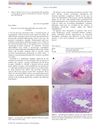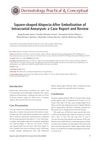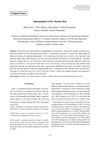 5 citations,
August 2014 in “Australasian journal of dermatology”
5 citations,
August 2014 in “Australasian journal of dermatology” Sorafenib can cause delayed skin problems, so patients need careful monitoring.
[object Object] 
research Hair
1 citations,
January 2016 in “Springer briefs in molecular science” The document suggests using safer, plant-based hair products instead of harmful synthetic ones.
 118 citations,
April 1998 in “Dermatologic Clinics”
118 citations,
April 1998 in “Dermatologic Clinics” Finasteride and minoxidil are effective for hair regrowth, while treatments for alopecia areata have varying success and continuous treatment is necessary.
 72 citations,
January 2001 in “Drugs”
72 citations,
January 2001 in “Drugs” Minoxidil and finasteride treat hair loss; more research needed for other options.
 48 citations,
January 2017 in “Skin Pharmacology and Physiology”
48 citations,
January 2017 in “Skin Pharmacology and Physiology” Finasteride-loaded nanoparticles may help treat alopecia.
 34 citations,
December 1991 in “Annals of the New York Academy of Sciences”
34 citations,
December 1991 in “Annals of the New York Academy of Sciences” The conclusion is that small hair follicles cause baldness in macaques, and treatments like antiandrogens and minoxidil can prevent hair loss and promote regrowth.
 29 citations,
January 2004 in “Experimental Dermatology”
29 citations,
January 2004 in “Experimental Dermatology” Topical anthralin helped regrow hair in mice with a condition similar to human alopecia.
 21 citations,
November 2011 in “The journal of investigative dermatology/Journal of investigative dermatology”
21 citations,
November 2011 in “The journal of investigative dermatology/Journal of investigative dermatology” Telogen is an active phase with important biological processes, not a resting phase.
 9 citations,
January 2015 in “Laboratory Animal Research”
9 citations,
January 2015 in “Laboratory Animal Research” Laminaria japonica and Cistanche tubulosa extracts combined may effectively promote hair growth.
 6 citations,
August 2020 in “Journal of Pharmaceutical Innovation”
6 citations,
August 2020 in “Journal of Pharmaceutical Innovation” Nanoemulgel improves hair growth and quality using finasteride without irritation.
 6 citations,
June 2017 in “Actas dermo-sifiliográficas/Actas dermo-sifiliográficas”
6 citations,
June 2017 in “Actas dermo-sifiliográficas/Actas dermo-sifiliográficas” Transplanting hair follicles into chronic ulcers helps them heal better.
 6 citations,
November 2010 in “Histochemistry and cell biology”
6 citations,
November 2010 in “Histochemistry and cell biology” The proteins transthyretin and megalin are more present in the growth phase of hair, suggesting they might affect hair health and growth.
[object Object]  2 citations,
January 2023 in “Prague Medical Report”
2 citations,
January 2023 in “Prague Medical Report” JAK inhibitors, like baricitinib, are effective and safe for treating alopecia areata.
 1 citations,
July 2022 in “Dermatology practical & conceptual”
1 citations,
July 2022 in “Dermatology practical & conceptual” Square-shaped hair loss can occur after treating a brain aneurysm due to localized radiation exposure.
 1 citations,
March 2021 in “Dermatological reviews”
1 citations,
March 2021 in “Dermatological reviews” AGA, a common hair loss, is caused by genetics, hormones, age, and environmental factors.
 1 citations,
January 2012 in “Journal of The Society of Japanese Women Scientists”
1 citations,
January 2012 in “Journal of The Society of Japanese Women Scientists” Murine hair has specific types of ceramides and glucosylceramides but lacks acylceramides.
 April 2024 in “bioRxiv (Cold Spring Harbor Laboratory)”
April 2024 in “bioRxiv (Cold Spring Harbor Laboratory)” GRK2 is essential for healthy hair follicle function, and its absence can lead to hair loss and cysts.
 September 2021 in “International journal of Ayurveda and pharma research”
September 2021 in “International journal of Ayurveda and pharma research” Ayurvedic treatment improved hypothyroidism in a 30-year-old man.
 December 2018 in “Journal of Advances in VetBio Science and Techniques”
December 2018 in “Journal of Advances in VetBio Science and Techniques” Low testosterone might be a common cause of hair loss in male dogs.
 166 citations,
November 1990 in “Journal of Investigative Dermatology”
166 citations,
November 1990 in “Journal of Investigative Dermatology” Minoxidil sulfate stimulates hair growth.
 65 citations,
April 2020 in “International Journal of Molecular Sciences”
65 citations,
April 2020 in “International Journal of Molecular Sciences” PRP injections may be a safe, effective alternative for hair loss treatment compared to minoxidil and finasteride.
 65 citations,
May 2010 in “Current Women's Health Reviews”
65 citations,
May 2010 in “Current Women's Health Reviews” Oxidative stress is a key factor in the development of Polycystic Ovary Syndrome, and weight management can improve symptoms.
 51 citations,
January 2003 in “Hormone Research in Paediatrics”
51 citations,
January 2003 in “Hormone Research in Paediatrics” Hormones and their receptors, especially androgens, play a key role in hair growth and disorders like baldness.
 47 citations,
August 2000 in “Endocrine Reviews”
47 citations,
August 2000 in “Endocrine Reviews” The document concludes that more research is needed to understand excessive hair growth in women with normal hormone levels and regular ovulation.
 37 citations,
September 2008 in “The American journal of surgical pathology”
37 citations,
September 2008 in “The American journal of surgical pathology” Hair follicle hyperplasia is common in both benign and malignant skin lymphoproliferative disorders, with a proposed new term "pseudolymphomatous adnexitis."
 32 citations,
January 2005 in “Advances in Biochemical Engineering / Biotechnology”
32 citations,
January 2005 in “Advances in Biochemical Engineering / Biotechnology” Fetal wounds heal without scarring because of different biological factors, which could help improve adult wound healing.
 30 citations,
December 2001 in “Journal of The European Academy of Dermatology and Venereology”
30 citations,
December 2001 in “Journal of The European Academy of Dermatology and Venereology” Hormonal therapy is a good option for women with severe acne, especially when there's a chance of hormone imbalance.
 25 citations,
May 2014 in “Facial Plastic Surgery”
25 citations,
May 2014 in “Facial Plastic Surgery” PRFM may help treat hair loss, especially in mild cases.
 22 citations,
December 2013 in “Molecular biology of the cell”
22 citations,
December 2013 in “Molecular biology of the cell” ILK is essential for proper hair follicle development and structure.
 17 citations,
June 2017 in “British Journal of Dermatology”
17 citations,
June 2017 in “British Journal of Dermatology” The article concludes that hair loss is a common side effect of drugs treating skin cancer by blocking the hedgehog pathway, but treatment should continue, and more selective drugs might prevent this side effect.






























